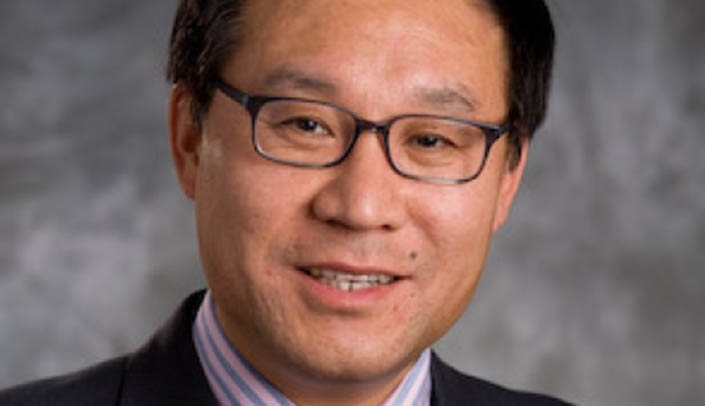 |
Yulong Li, M.D., Ph.D. |
- Name: Yulong Li, M.D., Ph.D.
- Title: Professor, UNMC Department of Emergency Medicine, College of Medicine
- Joined UNMC: 2002
- Hometown: Chengde, China
Research focus:
- Cardiovascular diseases, diabetes
The Distinguished Scientist Award
The Distinguished Scientist Award — which is sponsored by the chancellor — recognizes researchers who have been among the most productive scientists at UNMC during the past five years.
The goal of my research is: To focus on the regulatory role of the peripheral nervous system in peripheral tissues (such as the heart, vasculature, and skeletal muscle) in pathophysiological conditions including chronic heart failure, diabetes, and ischemia-reperfusion injury. One of my projects is to test the potential mechanisms of tourniquet-induced ischemia-reperfusion injuries in the skeletal muscle and neuromuscular junction. Another one of my projects is to explore the cellular and molecular mechanisms for the impairment of cardiac vagal and sympathetic postganglionic neurons, and to reveal the correlation of fatal ventricular arrhythmia with dysfunction of these neurons in chronic heart failure and type-2 diabetes.
The Distinguished Scientist Award
The Distinguished Scientist Award — which is sponsored by the chancellor — recognizes researchers who have been among the most productive scientists at UNMC during the past five years.
My research will make a difference because: Lethal ventricular arrhythmias and sudden cardiac death account for high mortality in patients with chronic heart failure or type-2 diabetes. Tourniquet-induced ischemia-reperfusion can cause severe skeletal muscle contractile dysfunction and permanent neurological deficiency, and lead to the limitation of tourniquet use (an effective means of arresting life-threatening limb hemorrhage on the battlefield and in civilian medicine). My research makes our further understanding of the mechanisms responsible for peripheral nervous dysfunction and provides potential therapeutic interventions for improving outcomes and quality of life in patients with chronic heart failure, diabetes, or post-trauma.
The best advice I’ve ever been given is: Be open-minded in your thinking and serious about what you do.
Three things you may not know about me are:
- I do not typically eat sweet foods.
- I love many sports activities as a spectator but not as a participant.
- My hometown is a small village surrounded by steep mountains.

congratulations!